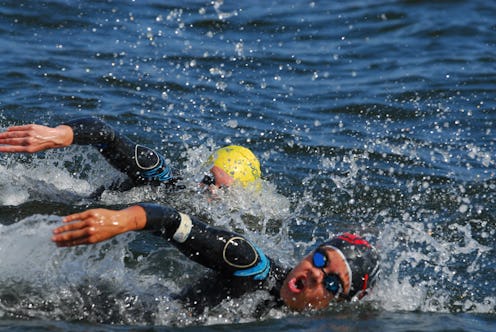Life
7 Ways to Ace Your First Triathlon

If you've been itching to try a triathlon, you're not the only one drawn to it: last year more than 550,000 people competed in a tri. Because this three-part race packs cardio and strength training, it's an insanely effective way to tone, and the variety is sure to beat workout boredom. The best part? With proper training, you can go from surfing your couch to doing a sprint triathlon—a 0.6-mile swim, 12.4-bike ride, and a 3.1-mile run— in only 12 weeks. Alison Kreideweis, co-founder of Empire Tri Club in New York City, gave us the scoop on how to tackle your first run, swim, and bike combo like a boss.
1. STRIVE FOR A 12-WEEK TRAINING PERIOD
Some things are meant to be shotgunned — beers, maybe weddings— but with a triathlon you definitely want to take time to train, whether you're a fitness newbie or a well-conditioned athlete. "I usually recommend a three month training period for beginners, that way you can get used to the flow of all the sports as well as significantly reduce risk of injury," says Kreideweis. Since running is the most high impact sport of the three, Kreideweis says, lack of preparation can cause shin splits, IT band, and hamstring issues. Plus, under-training can hamper results. "No matter what your fitness level, if you rush, you might not do as well as you expected and end up not liking the sport." You'll want to make sure to alternate days between sports, too — for example, no intense biking two days in a row — and also make time for recovery days, which will let muscles to rest and actually help you improve faster. Find sample 12 week beginner plans here and here.
2. FOCUS ON YOUR WEAKNESS
Just as you make a list of strengths and weakness before a job interview, survey your fitness profile before and even during training and put more effort into the part you're struggling with. "One of the biggest mistakes that people make when training for triathlon is to focus on what they are most comfortable doing and avoid the part that needs work," says Kreideweis. "Most people need work in swimming if it's their first time, but whatever part is your least favorite, spend time on that. It'll help you be more comfortable during the race."
3. YOU PROBABLY DON'T NEED A NEW BIKE
No, your pink Schwinn cruiser won't work, but for a triathlon virgin, the right bike only needs a few key traits. "Ideally you want to be using a road bike because it will be a whole lot harder to train and ride on a cruiser," says Kreideweis. "But most importantly, you want a bike that fits you properly and that is safe, meaning, has been tuned up and has working gears." Your local bike shop will be able to do the proper fit and adjustments. Wait to commit to a more specialized bike when you know you're going to do more triathlons, says Kreideweis.
4. DON'T WORRY ABOUT CARBS
You don't need to have a huge pasta dinner the night before or load up on bagels and oatmeal the day of a race. This technique, called carb-loading, is really only necessary for endurance events such as marathons, says Kreideweis. "Your race will only be about an hour and a half, so instead of downing carbs, eat something that's easy to digest and familiar," she says. Whole grain toast with peanut butter, a power bar, or fruit and cheese will all do the trick and keep energy levels steady.
5. NOTHING NEW ON RACE DAY
The day of your tri is not the time to switch up your running shoes or eat a bacon, egg and cheese if you've been opting for smoothies throughout training. "You want to stick with the plan and eliminate making new decisions," says Kreideweis. Novelty also puts you at risk for unnecessary distractions, like an upset stomach or blisters, which can hurt performance.
6. PACE YOURSELF
Adrenaline will pump you up on race day, but don't let it veer you off course by going too fast too soon. "You want to challenge yourself during each part of a triathlon, but try to keep to the pace you felt was good for you during training," says Kreideweis "Meaning, if you run a nine minute mile, don't start out sprinting a seven minute mile because you won't be able to sustain it." It's important to remember that you'll be out there with people of all different abilities— you'll get passed, but you'll probably pass others, too—so focus on yourself.
7. YOUR GOAL: FINISH WITH A SMILE
Even if you're a seasoned runner, a tri is whole different beast to conquer. "You want to finish feeling encouraged, so your first goal should be just to cross the finish line," says Kreideweis. "Rather than focus on overall time, aim to just have a good race and feel good when you finish."
Image: Fotolia/Bruno Bouvry